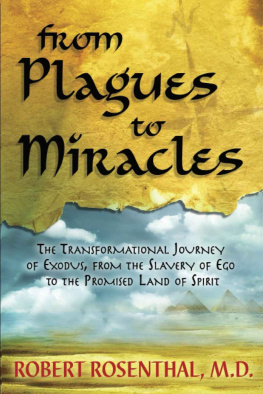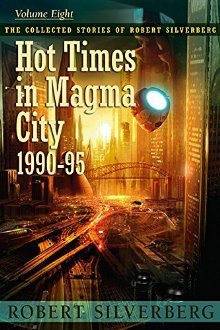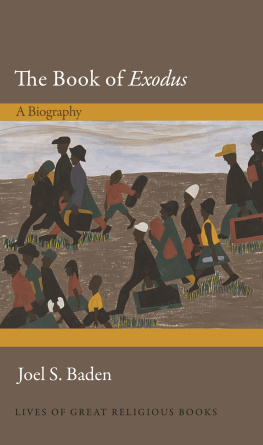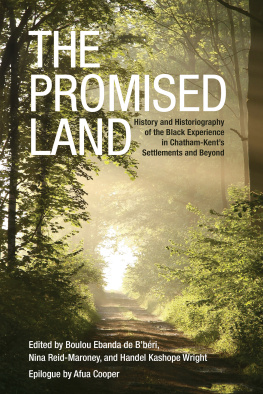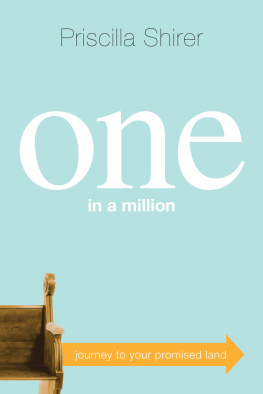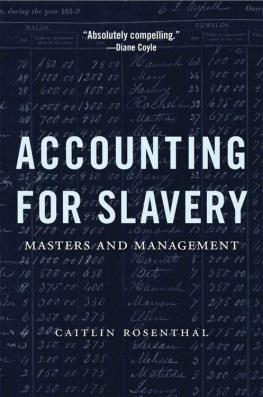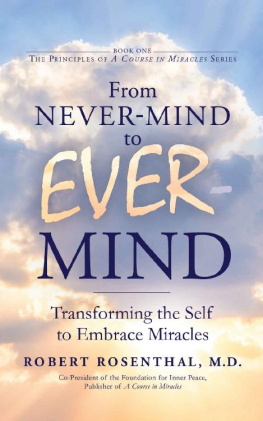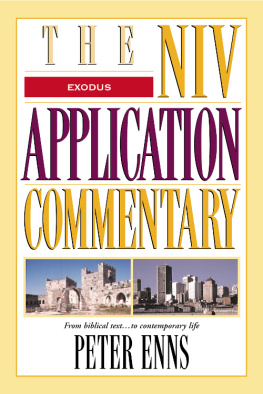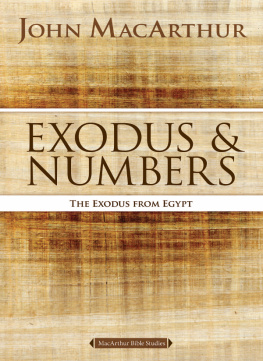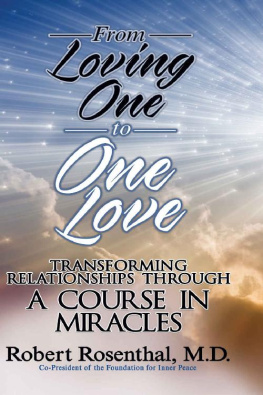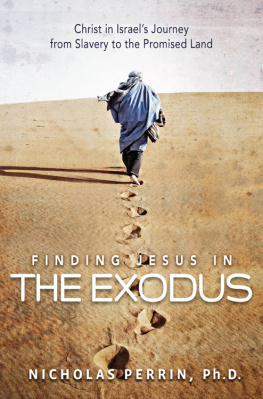The Transformational Journey of Exodus, from the Slavery of Ego to the Promised Land of Spirit
Robert Rosenthal, M.D.
Great Rays Books
Published by Great Rays Books
Novato, CA
Copyright 2012 by Robert S. Rosenthal, M.D.
All rights reserved. No part of this book may be reproduced by any mechanical, photographic, or electronic process, or in the form of a phonographic recording; nor may it be storedin a retrieval system, transmitted, or otherwise be copied for public or private useother than for fair use as brief quotations embodied in articles and reviewswithout prior written permission of the publisher.
The author of this book does not dispense medical advice or prescribe the use of any technique as a form of treatment for physical, emotional, or medical problems without the advice of a physician, either directly or indirectly. The intent of the author is only to offer information of a general nature to help you in your quest for emotional and spiritual well-being. Inthe event you use any of the information in this book for yourself, which is your constitutional right, the author and the publisher assume no responsibility for your actions.
Except where otherwise indicated, all scripture has been taken from the New American Standard Bible , copyright 1960, 1962, 1963, 1968, 1971, 1972, 1973, 1975, 1977, 1995 byThe Lockman Foundation. Used by permission.
Material from Emptiness Dancing by Adyashanti, copyright 2004, 2006, Adyashanti. All rights reserved. Used with permission from Sounds True, Inc., Boulder, CO, www.soundstrue.com.
Rumi verse from
Birdsong, copyright 1993, Coleman Barks. All rights reserved. Usedwith permission of the translator, Coleman Barks.
The names and certain biographical details of the patients whose stories the author tells have been changed to preserve con dentiality and protect their privacy. The essential truth of their stories, however, remains unaffected.
Project editor: Patrick Gabrysiak
Cover & interior design: Tricia BreidenthalPhotograph on back cover: Sophia Rosenthal
Library of Congress Cataloging-in-Publication DataRosenthal, Robert S.
From plagues to miracles : the transformational journey of Exodus, from the slavery of ego
to the promised land of spirit / Robert S. Rosenthal. -- 1st ed.
p. cm.
Includes bibliographical references.
1. Change (Psychology)--Religious aspects. 2. Spiritual life--Psychology. 3. Psychology
-Religious aspects. 4. Bible. O.T. Exodus--Criticism, interpretation, etc. 5. Bible. O.T.--Psychology. I. Title.
ISBN: 978-1-7320491-0-9
For Bill Thetford, Ph.D., who always said Id write a book one day.
And for Al Rosenthal, M.D., my father, who sadly did not live to see this book completed.
contents
Preface: The Exodus Journey.................................... ixIntroduction: The Parable of Exodus.............................. xv
preface
THE EXODUS JOURNEY
The idea that life is a journey is an old and familiar one. Justas the sun travels its course across the sky from dawn to dusk, so do we set out at birth upon an unknown road, following its twistsand turns through childhood and adolescence, adulthood and old age, until at last death steps forth, calling an end to our adventure.The suns path is unswerving, its purpose and destination never indoubt. Not so with the journey we make.
For within lifes journey, there are many side trips that call tous. We travel down byways of relationship, career, and family. Weeagerly explore those trails that promise happiness and success. We seek the fair maiden, the handsome prince, the dragon to beslain, the pot of gold at the rainbows end. We pursue our own versions of Ahabs white whale, Kurtz in the jungles heart of darkness, and Shangri-La.
Behind all these journeys, however, there lies another, morefundamental journey, one that enfolds all the others in its scope and purpose. This is the spiritual journeyto discover, and to recover, our innate spiritual essence and the absolute freedom thatcomes with it. The spiritual journey is by its nature transformational, for it takes us from a limited, ego-bound sense of who weare and how we fit into the world to the recognition of our trueSelf: timeless, boundless, and extending well beyond the realm ofthe five senses.
Somewhere along lifes path, this spiritual journey awaits eachof us. We undertake it in our own unique way, in our own time, and at our own pace. I have been both traveler and guide on this journey. As traveler, manys the time Ive found myself stumbling,lost, uncertain of my progress, or even of the destination itself. Am I headed in the right direction? Are the landmarks along the routethe people and events that show up in my lifetrue andtrustworthy? Or are they false decoys bound to lead me astray? AmI moving forward, or traveling in circles? And how will I know for sure when Ive finally reached my destination?
The spiritual journey is arduous enough as it is. If we lose our way chasing after diversions, it becomes almost impossible. Sohow do we stay on track? How do we keep our bearings? If onlythere were a map of some kind to pinpoint our location and steer us through this unfamiliar terrain. Such a map would indicate the stage of the journey that were currently passing through, as wellas whats necessary to successfully navigate it. It would also warnus of what obstacles lie ahead, in the next stage, so we can be prepared to meet them.
There are, of course, many road maps available to the spiritual seeker, some helpful, none perfect. Some come from esoteric religious traditions that are closed off to the average aspirant. Othersare rooted in Buddhist or Hindu concepts that can be hard for the Western mind to grasp. But there is one map thats grounded inthe Judeo-Christian heritage: the book of Exodus from the Hebrew Bible. In fact, its so well-known that few people ever recognize itfor what it is. Yet read and understood correctly, Exodus turns out to be a profound guide to the spiritual journey. It marks the pathout of bondage. It makes clear what we must do to reach God directly. And it demonstrates by example those patterns of thought and behavior that stand in the way of transformation and detour us into years of fruitless wandering.
Exodus tells the tale of the Hebrews escape from slavery inEgypt. It chronicles their transition from a people suffering without hope and seemingly cut off from God to a free people led by God Himself in a very direct and personal way through his
xrepresentative, Moses. Over the centuries, Exodus has inspiredmany renowned seekers of freedom, including Benjamin Franklin, Thomas Jefferson, and Dr. Martin Luther King, Jr. This alone would make it one of the greatest teaching tales of all time. But aswe shall see, there is more to Exodus... much more.
I am neither a biblical scholar nor a clergyman. I am a psychiatrista psychotherapistand my knowledge of scripture is limited. But when I come upon an extraordinary tale (such asExodus)whether from a patients lips or the pages of a bookI am trained to seek out its deeper layers of meaning. I cant helpmyself. I need to delve beneath the words, to find and grasp the storys essence. What is it that makes this particular story so meaningful? How does it speak to us? Well, when I read Exodus in this way, what I find there is a handbook for transformational change.
What do I mean by transformational change? Any change thatcompletely alters our sense of self and our place in the universe. We emerge truly a different person. To others we may look the same, but something fundamental within us has shifted. The familiar old worries and preoccupations, the desires and hopes thatonce held us captive and that still grip those around us, no longerapply. Its as though weve been reborn into a new world... and theres no going back. Not that we would ever want to.

